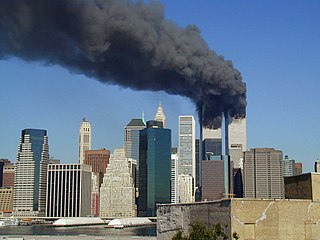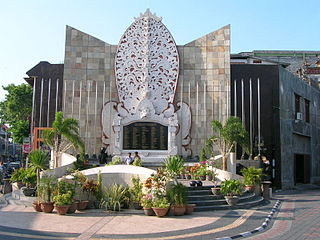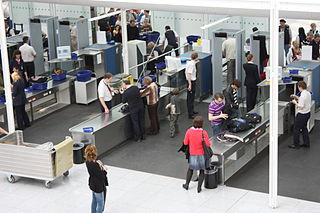
United Nations Security Council Resolution 1373, adopted unanimously on 28 September 2001, is a counterterrorism measure passed following the 11 September terrorist attacks on the United States. The resolution was adopted under Chapter VII of the United Nations Charter, and is therefore binding on all UN member states.

United Nations Security Council resolution 1566, adopted unanimously on 8 October 2004, after reaffirming resolutions 1267 (1999), 1373 (2001) and 1540 (2004), the Council condemned terrorism as a serious threat to peace and strengthened anti-terrorism legislation.
The Counter-Terrorism Committee is a subsidiary body of the United Nations Security Council.

United Nations Security Council resolution 1540 was adopted unanimously on 28 April 2004 regarding the non-proliferation of weapons of mass destruction. The resolution establishes the obligations under Chapter VII of the United Nations Charter for all member states to develop and enforce appropriate legal and regulatory measures against the proliferation of chemical, biological, radiological, and nuclear weapons and their means of delivery, in particular, to prevent the spread of weapons of mass destruction to non-state actors.

United Nations Security Council resolution 1363, adopted unanimously on 30 July 2001, after reaffirming all resolutions on the situation in Afghanistan, including resolutions 1267 (1999) and 1333 (2000), the Council requested the Secretary-General to establish a mechanism to monitor the implementation of sanctions against the Taliban.
United Nations Security Council Resolution 1377 was adopted unanimously at a ministerial meeting on 12 November 2001; the Council adopted a declaration concerning efforts to eliminate international terrorism.
United Nations Security Council resolution 1390, adopted unanimously on 16 January 2002, after recalling resolutions 1267 (1999), 1333 (2000), 1363 (2001), 1368 (2001), 1373 (2001) 1378 (2001) and 1383 (2001) concerning the situation in Afghanistan and terrorism, the Council imposed further sanctions on Osama bin Laden, Al-Qaeda, the Taliban and others associated with them.

United Nations Security Council Resolution 1438, adopted unanimously on 14 October 2002, after reaffirming the principles of the United Nations Charter and Resolution 1373 (2001), the Council condemned the bombings in Bali, Indonesia.

United Nations Security Council resolution 1440, adopted unanimously on 24 October 2002, after reaffirming the principles of the United Nations Charter and Resolution 1373 (2001), the Council condemned the hostage-taking at a theatre in Moscow, Russia, by Chechen militants.

United Nations Security Council resolution 1455, adopted unanimously on 17 January 2003, after recalling resolutions 1267 (1999), 1333 (2000), 1363 (2001), 1373 (2001), 1390 (2001) and 1452 (2002) concerning Al-Qaeda, the Taliban and terrorism, the council improved the implementation of measures against the groups. It was the first Security Council resolution adopted in 2003.
United Nations Security Council resolution 1456, adopted unanimously on 20 January 2003 in a meeting at the foreign minister level, the council adopted a declaration calling on all states to prevent and suppress all support for terrorism. The resolution did not define terrorism, but unlike other previous resolutions, mentioned human rights for the first time.

United Nations Security Council resolution 1465, adopted unanimously on 13 February 2003, after reaffirming the principles of the United Nations Charter and Resolution 1373 (2001), the council condemned the bomb attack outside the El Nogal Club in Bogotá, Colombia on 7 February 2003.
United Nations Security Council resolution 1526, adopted unanimously on 30 January 2004, after recalling resolutions 1267 (1999), 1333 (2000), 1363 (2001), 1373 (2001), 1390 (2001), 1452 (2002) and 1455 (2003) concerning terrorism, the council tightened sanctions against Al-Qaeda, the Taliban, Osama bin Laden and associated individuals and groups.

United Nations Security Council Resolution 1963, adopted unanimously on December 20, 2010, after reaffirming resolutions 1373 (2001), 1535 (2004), 1624 (2004), 1787 (2007) and 1805 (2008), the Council decided to continue the Counter-Terrorism Committee Executive Directorate (CTED) under the guidance of the Counter-Terrorism Committee (CTC) for another three years until December 31, 2013.

United Nations Security Council resolution 1617, adopted unanimously on 29 July 2005, after recalling resolutions 1267 (1999), 1333 (2000), 1363 (2001), 1373 (2001), 1390 (2001), 1452 (2002), 1455 (2003), 1526 (2004) and 1566 (2004) concerning terrorism, the Council renewed sanctions against Al-Qaeda, the Taliban, Osama bin Laden and associated individuals and groups for a further seventeen months.

United Nations Security Council resolution 1624, adopted unanimously at the 2005 World Summit on 14 September 2005, after reaffirming previous resolutions on terrorism, including resolutions 1267 (1999), 1373 (2001), 1535 (2004), 1540 (2004), 1566 (2004) and 1617 (2005), the Council called on all states to co-operate in order to strengthen the security of their international borders by enhancing terrorist screening and passenger security procedures.

United Nations Security Council Resolution 1735, adopted unanimously on December 22, 2006, after recalling resolutions 1267 (1999), 1333 (2000), 1363 (2001), 1373 (2001), 1390 (2001), 1452 (2002), 1455 (2003), 1526 (2004), 1566 (2004), 1617 (2005), 1624 (2005) and 1699 (2005) on terrorism, the Council approved measures to improve the identification and control of terrorists.
United Nations Security Council Resolution 1787 was unanimously adopted on 10 December 2007.
United Nations Security Council Resolution 1805 was unanimously adopted on 20 March 2008.
The UN Counter-Terrorism Implementation Task Force (CTITF) was an instrument designed to roll out the UN Global Counter-Terrorism Strategy.











